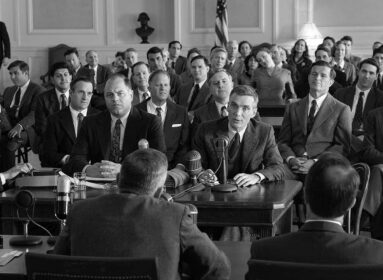Award-winning Israeli writer talks about the success of Israeli TV in the U.S.
By Cindy Mindell
With only two television networks, Israel – faraway, isolated, and war-weary – has created a TV industry that is a premier exporter of programs, from drama series to game shows to docu-reality. Showtime’s Homeland and HBO’s In Treatment, both adaptations of original Israeli shows, have expanded the influence of the young industry across the world.
Tel Aviv native Ron Leshem, 36, is an award-winning writer and acclaimed novelist in Israel. After three years as a reporter in the West Bank and Gaza, he was promoted to head of the news division of Israel’s most widely read daily newspaper, Yediot Ahronot, where he also wrote as a military-affairs analyst. By age 26, he was deputy chief editor for Ma’ariv, one of Israel’s three main newspapers, simultaneously writing short stories for Le Monde in France and columns for various European newspapers.
From 2006 to 2009, Leshem served as head of programming and content for Keshet Broadcasting, Israel’s leading TV network, responsible for the development and production of several of the most popular and successful Israeli TV series and garnering industry awards.
As a novelist, Leshem has earned top Israeli literary awards, including the annual Sapir Prize for Literature for his debut novel, Beaufort, hailed on the Israeli bestseller list for two years and translated into more than 20 languages. The film version, which Leshem co-wrote, was nominated for the Academy Award for Best Foreign Language Film and won the Berlin International Film Festival Silver Bear for Best Director. Leshem created and co-wrote the drama-thriller series for Israeli television, The Gordin Cell, which received 11 nominations for the Israeli Academy of Film and Television awards. The series has been sold to NBC as the remake, M.I.C.E., with the pilot to be written and directed by Friday Night Lights writer Peter Berg.
Leshem will discuss “Israel as Number One Exporter of TV Shows” on Thursday, Nov. 7 at Wesleyan University, part of the annual series, Contemporary Israeli Voices, organized by Adjunct Assistant Professor of Religion and Israel Studies, Dalit Katz. He spoke with the Ledger about how a tiny country has such a big creative roar.
Q: How were you attracted to writing in general, and to TV writing in particular?
A: Ever since I got out of the army, I’ve always been schizophrenically torn between my attraction to directing and editing, and my attraction to creating. I write books, drama series, and films. And on the other hand, I was a senior manager for the TV stations and a senior editor for the newspapers and I liked both very much. The beauty is that in the show-runner job for drama series I find an integration between writing and artistic creation, and the privilege to express a message, in parallel with managing and producing. Today, I continue to combine the two, but my main aspiration is to write.
Q: What drives you in your writing?
A: Just as an actor can be a prostitute one evening and a king the next, and the stage gives him the opportunity to take a break from his life and to escape, that’s how writing is for me: it’s an opportunity to live under the skin of other people, usually different from me, people who are my alter-ego, places forbidden for me to go, experiences that I missed out on. Even though, in each of my characters I find myself and my unfinished business, I have no interest in writing myself as a character; rather, I use writing as a way to be someone I wish I were, or to be near someone I’m in love with who could never love me back. That’s what’s so shocking about writing. And it requires a huge process of investigation in order to be able to speak in the voice of another person and to build a convincing world by means of language. When I come home at night from the office, the last thing I have strength for is to write about a TV guy in Tel Aviv, about my own life. I want to lift off.
The second impulse that brings me to writing is the need to say something, or usually to yell something that’s important for me to say. To fight for something right, that’s what we’re doing in the most romantic profession in the world. It’s usually the issues within Israeli society that get me excited, but not exclusively. And the third impulse is the opportunity to explore what I would do in a certain situation.
Q: How has Israel become such a powerhouse in the world of TV production?
A: Essentially, everything is playing to our disadvantage. Israel is a tiny country – smaller than 47 of the U.S. states – the size of New Jersey, and only has 1.5 million native Hebrew-speaking homes. That’s like Sacramento and its suburbs. And our television industry was born only 20 years ago. Before that, there was barely one TV network in Israel, and it was controlled by the government. Our budgets are limited; we must shoot an entire series on a budget that resembles the catering budget on the set of one episode of an American TV drama. We don’t have the budget to shoot a pilot episode; we shoot the whole series at once; and so it’s also not possible to take a series off the air mid-season.
That allows us to take more risks. We need to create series that are “tribal campfires” with as many viewers as possible, and so we have to create for the mainstream. On the other hand, the Israeli public is impatient and gets bored easily, so we have to be edgy. We must be mainstream and edgy, which are actually complete opposites, and that creates an interesting situation.
The geopolitical environment that surrounds us turns us into neurotics and paranoids. We are a society steeped in trauma because each one of us comes from a different disaster, and that leads to highly charged personal stories.
Thirty-eight percent of Israelis were born overseas and migrated to the country, which creates very diverse and emotionally vulnerable voices. And also, something in our national character is less fearful of failure. Add to that the fact that culturally, we are very close to the American sensibility, and mostly watch American TV and cinema, so that the exchange also works in the opposite direction: it’s easier to promote our products in the U.S. market.
So, despite the language barrier, just like Shameless and House of Cards came from the UK to the U.S. as remakes, it’s very easy for our series to be relevant and competitive as well. And all the disadvantages I mentioned are actually benefits for us because as soon as we can’t compete in terms of production values – and the American producers do that so amazingly well – anything we do will essentially be inferior. So there’s no sense in our trying to produce a series unless it succeeds in inventing something new, taking a big risk, and forcing the viewer to take a look at himself and to feel troubled. That, for me, is the essence of drama.
Q: What is the current environment for the TV industry?
A: These are very good and exciting times, because this is the “golden age” of American cable series, which have become the new literature in the U.S. And we are trying to participate and compete in this arena. It’s a blast. For several years, Israel has been the high-tech and start-up nation. Every year, there are five times as many start-up companies created in Israel than in Europe, companies that gamble on new inventions. Almost all the big American high-tech companies have large content-development facilities in Israel. To my delight, this creative innovation is now also expressing itself in the field of television.
There are those who would say that the whole Israeli wave in American TV is merely the buzz around Homeland. In other words, they would say that the success of Homeland and of In Treatment before that, changed the Israeli television industry into a trend – the hot thing at the moment. It’s true that Hollywood respects success, and so the success opened doors for us and made everything much easier. But there are a few other interesting and surprising factors that changed Israel into the largest exporter of TV programs in the world today.
Q: What are the particular challenges Israeli TV writers face in trying to design programs for export?
A: When we produced Chatufim for Channel 2 in Israel, the original version of Homeland, we actually thought that because it was such an Israeli series that no foreigner would ever understand it. In Israel, the subject of prisoners held by terror organizations comes up twice a week in the headlines, the dream to see them returned alive is at the heart of the Israeli ethos. Many songs are written about prisoners; countless massive demonstrations are continually dealing with the question of how many hundred terrorists must be freed in exchange for the return of one of our prisoners, alive. This is a very Israeli story.
There are countries that export superb TV, like Sweden and Denmark, which have also managed to bring to the U.S. this year series like The Bridge and The Killing. But in those cases, the creators can make a good living and to also produce domestic shows, and so they are less “obsessive” about the American dream – to make it big in the U.S.
In Israel, because the industry is so small and it’s hard to earn a living at it, to aspire to success abroad is almost a necessity. And in general, Israelis are very attached to the “American dream;” it is the manifestation of success, in our eyes, in the fields of high-tech, in business, and in TV production.
Ron Leshem will discuss “Israel as Number One Exporter of TV Shows” on Thursday, Nov. 7, 8 p.m., at Wesleyan University, Russell House, 350 High St., Middletown, as part of the annual series, Contemporary Israeli Voices. For information call (860) 685-2297 or email dkatz01@wesleyan.edu.








 Southern New England Jewish Ledger
Southern New England Jewish Ledger









